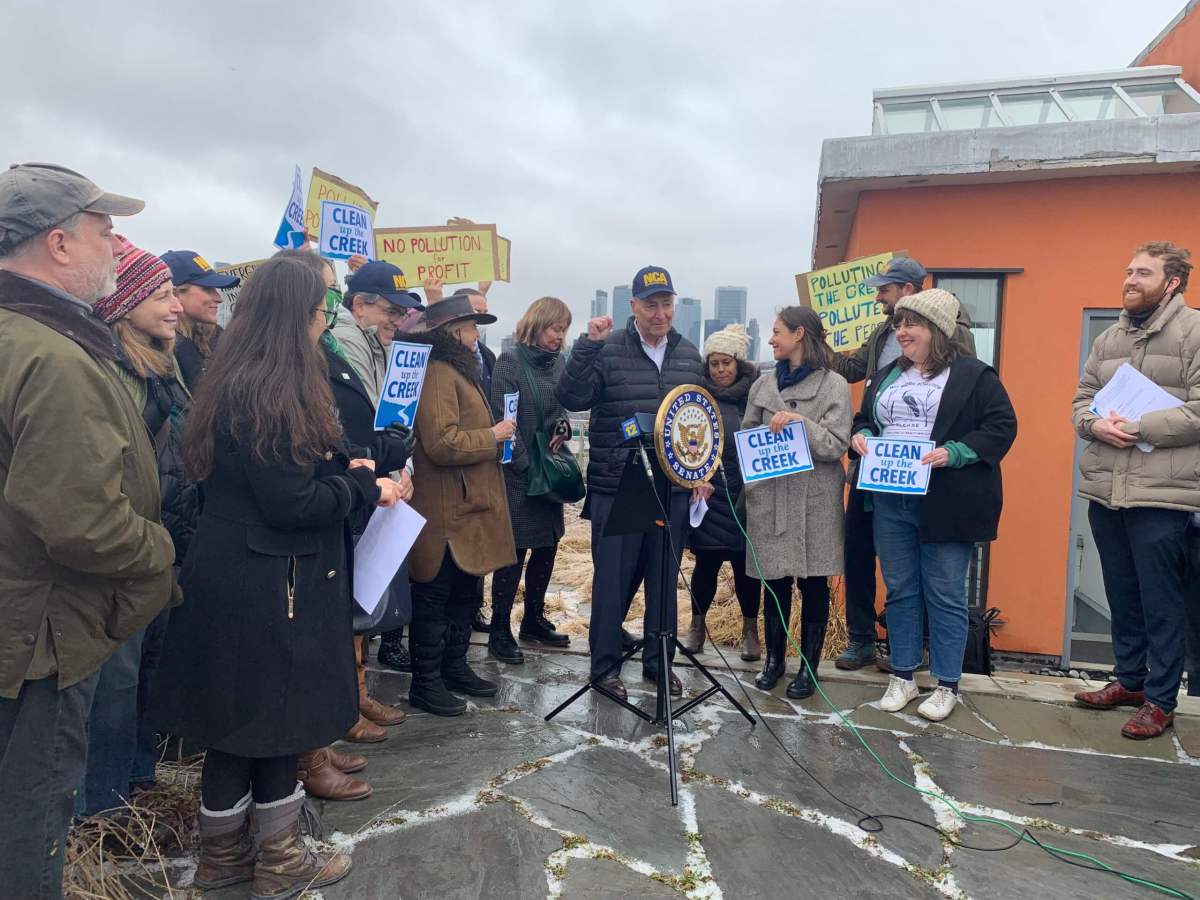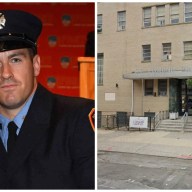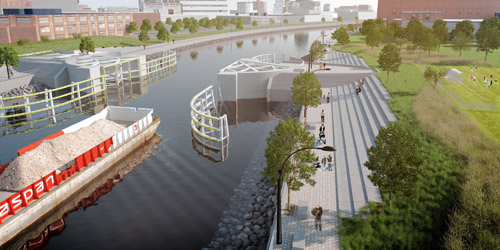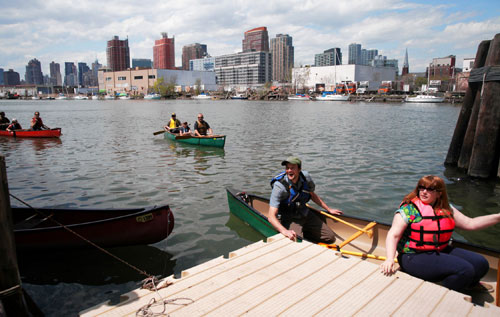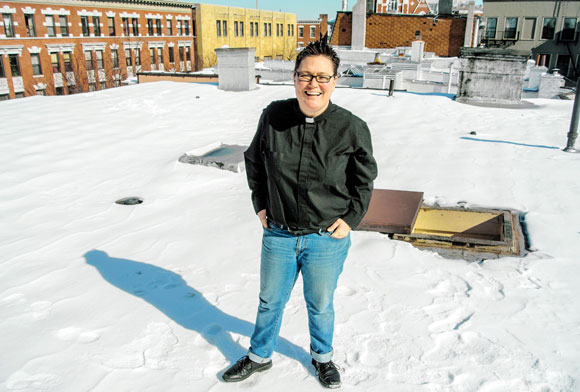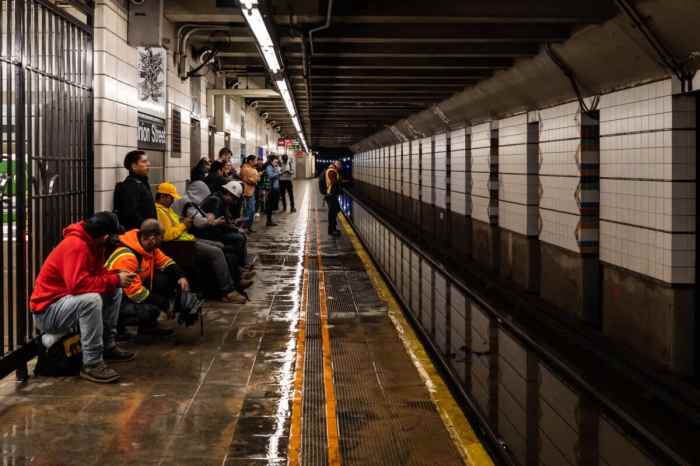The long-delayed cleanup of the Newtown Creek Superfund site needs to be sped up, and an influx of federal dollars toward National Superfund cleanup should put the wind in the sails of the Environmental Protection Agency and the parties responsible for funding the process, said Senate Majority Leader Chuck Schumer on Friday.
“Unfortunately, the polluters, even when they agree to pay, want to delay and minimize,” he said at a press conference in front of the creek. “We want the polluters to speed things up and maximize.”
Brooklyn is home to three Superfund sites — Newtown Creek, the Gowanus Canal, and the Wolff-Alport Chemical Company. The heavily-polluted, often-dangerous sites are usually a result of years of irresponsible dumping of waste and chemicals by large industrial companies. Once the EPA designates a Superfund site, they can identify the “potentially responsible parties,” or PRPs, and force them to contribute money to the cleanup.
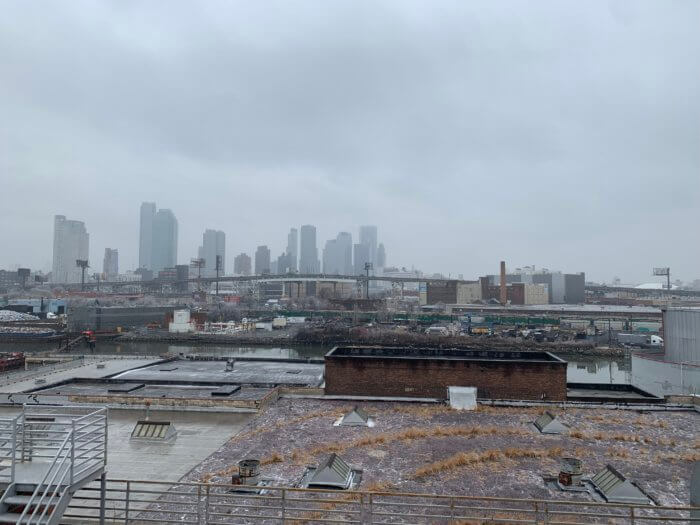
Late last year, President Biden signed off on the $1 trillion infrastructure bill with promises of shoring up the country’s roads and bridges. Tucked away in the bill was $3.5 billion for the cleanup of “orphan” Superfund sites, like Wolff-Alport, which don’t have any PRPs and rely entirely on government funding for cleanup.
But Newtown Creek, a tributary of the East River that cuts divides Brooklyn and Queens, isn’t an orphan site, with five PRPs and the City of New York agreeing to fund the cleanup under a 2011 settlement with the EPA.
Since then, though, very little has been done to clean up the Creek. In a July 2021 community update, the EPA said they anticipated issuing a cleanup plan no sooner than 2024.
Schumer called for the “new Biden administration EPA,” including recently-named regional director Lisa Garcia, to hustle on the cleanup.
“We’re telling the EPA, we want you to kick ass,” the longtime senator said. “And get ExxonMobil, and Texaco, and Phelps-Dodge, and National Grid. All of these companies who so polluted Newtown Creek to get moving and clean it up.”
The $3.5 billion allocated to the orphan sites should free up resources at the EPA to “redouble their efforts” to start pursuing the polluters, Schumer said.
The money is a good start, but long-term policy changes are needed to keep the program funded and dirty sites scrubbed, said Michael Lang, a community liaison for U.S. Rep. Nydia Velázquez.
“In 2018, [Velázquez] introduced legislation to reinstate the Superfund tax on big oil and chemical companies,” Lang said. “The Build Back Better Act includes reinstatement of the Superfund tax, taking action from the congresswoman’s bill. This is imperative to the fund’s long-term outlook.”
Velázquez’s proposed bill would also create a special loan under the Small Business Administration to help small businesses who are suddenly forced to move their operations due to Superfund actions, he added.
Though the Infrastructure Bill does reintroduce a version of the Superfund tax, there are significant carveouts for the oil industry — substances derived from coal, for example, are exempt from the tax, as are methane and butane if they’re used for fuel.
Local Assemblymember Emily Gallagher said the work to clean up the creek goes hand-in-hand with ending city and state reliance on fossil fuels, which she said contributes to the ongoing pollution at the creek as heavy industry continues along its banks on both sides.
“Oil is at the root of so many harms, both human and environmental and ecological, where we are seeing so many things suffer because of our legacy with oil,” she said. “So, our first step is getting this Superfund site cleaned up, and our second step is making sure there is never a site like this again, and that we move forever off of oil and gas as a source for anything. We have other options.”
Cleaning up the polluted industrial sites that border Newtown Creek is necessary to keep the body healthy, said Willis Elkins, executive director of the nonprofit Newtown Creek Alliance, because the chemicals that seep into the ground often end up running into the water.
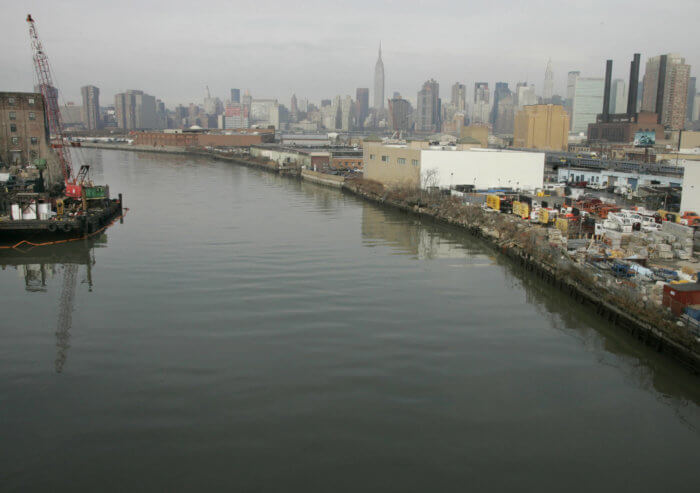
“It’s not that, necessarily, they need to shut down their operations, per se, but it is that the industries that have created a lot of the pollution still have pollution on their sites,” he told Brooklyn Paper. “In a larger sense, yes, we need to be transitioning from dirty fossil fuel, because that still is posing not just a climate threat but a threat to our local environment as well.”
For sites like Newtown Creek, who have responsible parties including some of the richest companies in the country, money shouldn’t be, and technically isn’t, an issue, Elkins said. But the influence those powerful companies have on the process can be.
“They’re not just getting footed with the bill, they’re actually negotiating with EPA along the way,” he said.
A few years ago, the Newtown Creek PRPs proposed an early-action cleanup for part of the site. Usually, the EPA would propose early action for a particularly polluted area of a Superfund, especially if it’s posing an immediate risk to human health. In this case, Elkins said, the responsible parties wanted to work on one of the cleanest parts of the Creek.
“The EPA spent a year and a half, two years entertaining this proposal,” he said. “They eventually shut it down and did not pursue it. But still, we spent multiple meetings talking about this, and the EPA assured us it was not a diversion of resources to take this on. But in the end, it was.”
Correction 3/2/2022: A previous version of this story referred to Michael Lang as a “spokesperson” for Rep. Nydia Velázquez’s office. Lang is a community liaison.


